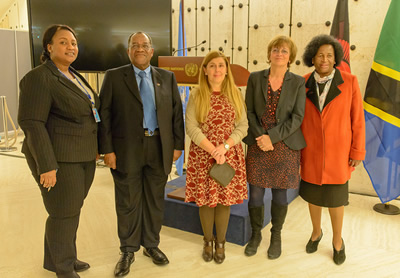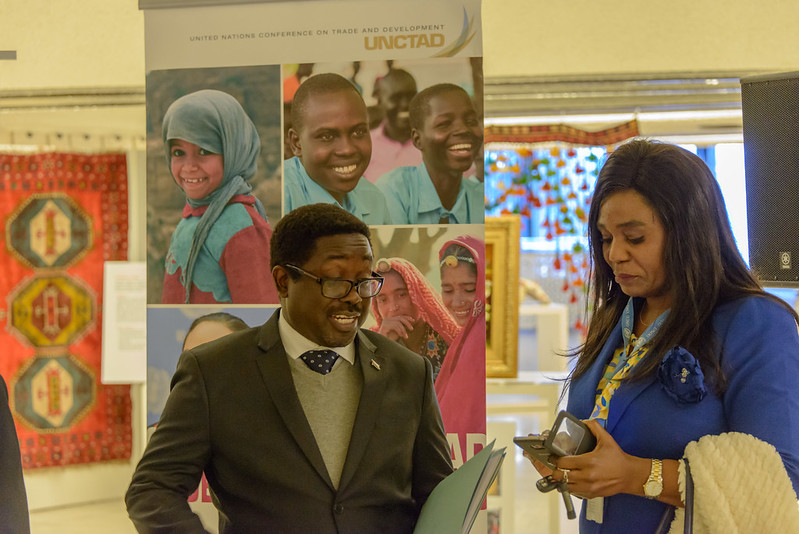Women cross-border traders in central Africa bring their stories to Geneva at UNCTAD exhibit and video screening.
The stories of women who trade small goods across borders in Malawi, Tanzania and Zambia, often by unofficial routes to avoid cumbersome and costly customs crossings, came to life in Geneva at a photography exhibit and video screening, called “Borderline”, marking International Women’s Week, 5–9 March 2018.
“Today, we wish to celebrate the courage of these women while celebrating the rights of all women, justice for all and equality,” UNCTAD Deputy Secretary-General Isabelle Durant said opening the event. “In most cases, cross-border trade is the only source of income available to women living near border areas.”
Ms. Durant explained that the women often remain trapped in informal trade with very limited opportunities and because they lack access to loans, entrepreneurship skills that makes it difficult to expand their businesses, and education on border procedures and customs rules which sometimes mean they pay more than they should.
“With no alternative, female traders are forced to cross the borders through informal routes, usually through bush paths and at night,” Ms. Durant said. “This exposes them to many risks.”
Variety of goods
UNCTAD travelled to border regions in Africa to hear dozens of stories from women traders. The photographic and video record of this research formed the basis of the “Borderline” project and was produced by Eye Level Art, a video and design company from Lilongwe, Malawi.
Ambassador Margret Mary Lungu Kaemba of Zambia said: “This project is critical in meeting the Sustainable Development Goals of alleviating poverty and improving the livelihoods of the women traders in our countries – and not just the women but the livelihoods of their families as well. My government is committed to addressing the challenges these women face and working with UNCTAD on this issue. Allow me to congratulate women and gender-sensitive men as we celebrate International Women’s Day.”
The exhibit showed women traders at their market stalls selling a variety of goods from second-hand clothes to fruit and flowers to beans and groundnuts. Markets visited included those in Chipata, Zambia, and Mchinji, Malawi.
First Secretary Neema Manongi, speaking on behalf of Ambassador James Alex Msekela of the United Republic of Tanzania, said: “In the East African community, women cross-border traders do not use available formal systems. Most of them do not understand the benefits gained through the signed treaties and protocols, for example the East African Community which has a shared customs union. It is worth noting that EAC has offered a number of facilities to the cross-border traders, particularly through the Simplified Trade Regime or STR.”
“This has impacted entire border communities: there is a reduction in transaction costs and the elimination of non-tariff barriers, for example reduced documentation required to cross the border, increased trade volumes due to the increased market of the EAC population estimated to be over 140 million people,” she added, calling for financing of micro-schemes that would ease the credit and knowledge deficit identified among women cross-border traders.
Low-interest fund
Ambassador Robert Dufter Salama of Malawi said: “Cross-border businesses are difficult to sustain. There are so many difficulties: for example, transport costs are very high, and two of the countries we are talking about – Malawi and Zambia – are landlocked. The cost of transporting goods from seaports to our countries is very expensive.”
“The other problem that has been cited is lack of knowledge. Many of the traders haven’t got far in education and the rules of international trade demand that people know about the rules and regulations of trade,” he said. “The World Trade Organization’s Trade Facilitation Agreement calls for a number of responsibilities on the part of traders themselves, and on the part of governments.
Mr. Salama said that the need for training was clear, but this required social spending. He identified Malawi’s need to “balance the needs of small-scale traders and pay off loans from the World Bank and others” which led to a “Catch 22 position”. He called for the establishment of a low-interest fund to assist women cross-border traders, noting that current interest rates from regular banks in Malawi were punitive.
Paying tribute
More than 100 guests attended the opening ceremony at the exhibit, on show until Friday at the United Nations in Geneva as part of a week of United Nations’ events highlighting aspects of women’s equality and empowerment.
Ms. Durant paid tribute to the women cross-border traders featured at the event.
“To me, these women entrepreneurs are a symbol of bravery,” she said.


